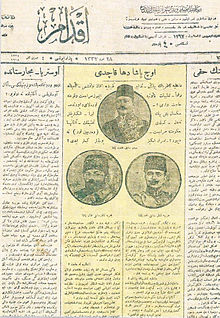Young Turkish Triumvirate
As three pashas of were Ottoman interior minister Mehmed Talaat , the War Minister Ismail Enver and Marine Minister Ahmed Cemal called. As leaders of the Young Turks since 1913, they were the leading political figures during the First World War and the time of the genocide of the Armenians .
Act
After the military coup of 1913, these three men became the de facto rulers of the Ottoman Empire until after the First World War. As members of the Committee for Unity and Progress, they became advocates of a “pan-Turkish” state, which in the words of Enver Pasha meant that the dhimmis had to be relocated . This means the non-Muslim population of the Ottoman Empire.
The three pashas were the main actors on the Ottoman side of the German-Ottoman alliance and the Ottoman entry into the First World War on the side of the Central Powers . Ahmed Cemal, however, was against the alliance with Germany - French and Russian diplomats tried to keep the Ottoman Empire out of the war - but Germany acted for it. Finally, the entry into the war was carried out on October 29, when Admiral Wilhelm Souchon moved into the Black Sea with SMS Goeben , SMS Breslau and a squadron of Turkish warships and attacked the Russian ports of Odessa , Sevastopol and Feodosiya . It is believed that Ahmed Cemal agreed to have Admiral Souchon conduct a preemptive strike in early October 1914 .
Enver took control of a military operation only once - the battle of Sarıkamış - and after its failure left the 3rd Army in a desolate state. The First Suez Offensive and the Arab Revolt are considered Ahmed Cemal's greatest failures.
literature
- Allen, WED and R. Muratoff. Caucasian Battlefields: A History Of The Wars On The Turco-Caucasian Border, 1828-1921. Cambridge: Cambridge University Press, 1953. p. 614
- Bedrossyan, Mark D. The First Genocide of the 20th Century: The Perpetrators and the Victims. Flushing, NY: Voskedar Publishing, 1983. p. 479
- Derogy, Jacques. Resistance and Revenge: "Fun Times" The Armenian Assassination of the Turkish Leaders Responsible for the 1915 Massacres and Deportations. New Brunswick, NJ: Transaction Publishers and Zoryan Institute, April 1990. p. 332
- Duzel, Nese (May 23, 2005). "Ermeni mallarını kimler aldı?". Radical. "Enver Paşa, Talat Paşa, Bahaittin Şakir gibi bir dizi insanın ailelerine maaş bağlanıyor ... Bu maaşlar, Ermenilerden kalan mülkler, paralar ve fonlardan bağlanıyor."
- Emin [Yalman], Ahmed. Turkey in the World War. New Haven, CT: Yale University Press, 1930. p. 310
- Joseph, John. Muslim-Christian Relations and Inter-Christian Rivalries in the Middle East. Albany: State Univ. of New York Press, 1983. p. 240
- Kayali, Hasan. "Arabs and Young Turks: Ottomanism, Arabism, and Islamism in the Ottoman Empire, 1908-1918" p. 195
Individual evidence
- ↑ Klaus Kreiser , Christoph K. Neumann: Small history of Turkey. Reclam, Stuttgart 2003, ISBN 3-15-010540-4 , p. 366
- ↑ Emin , p. 310; Kayali , p. 195
- ↑ Derogy , p. 332; Kayali , p. 195
- ^ Allen , p. 614
- ^ Joseph , p. 240; Bedrossyan , p. 479
